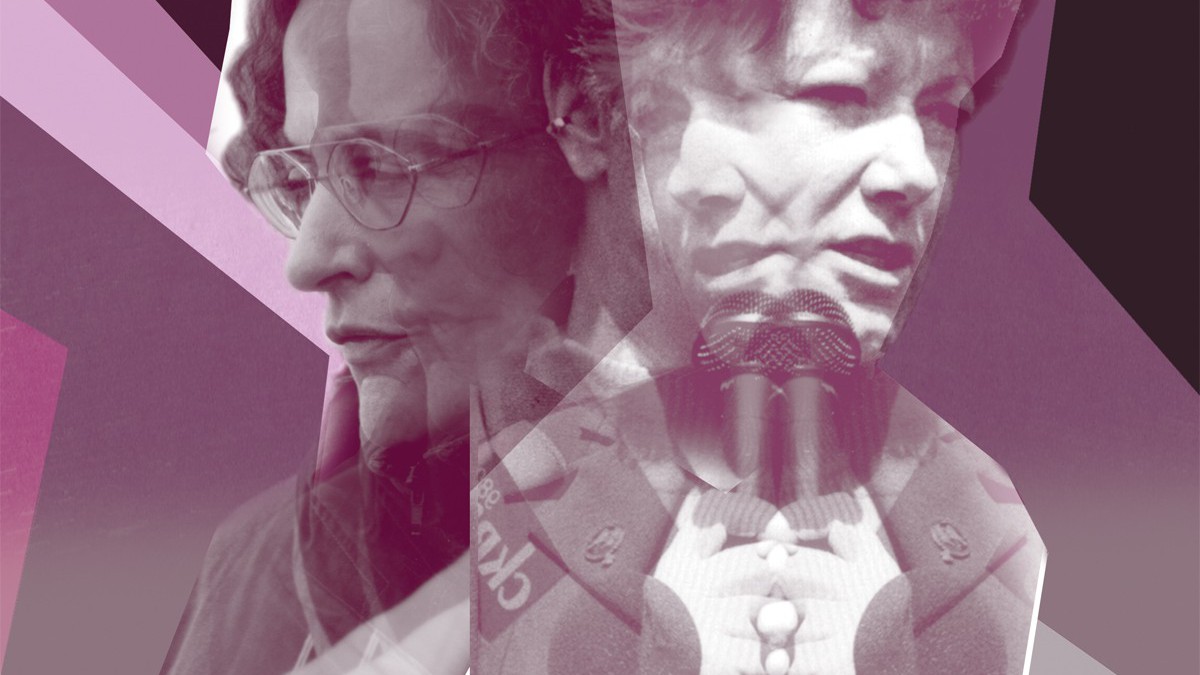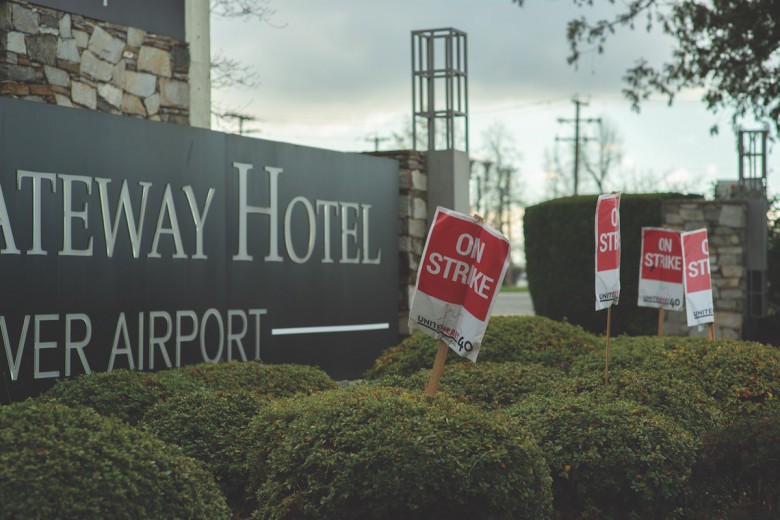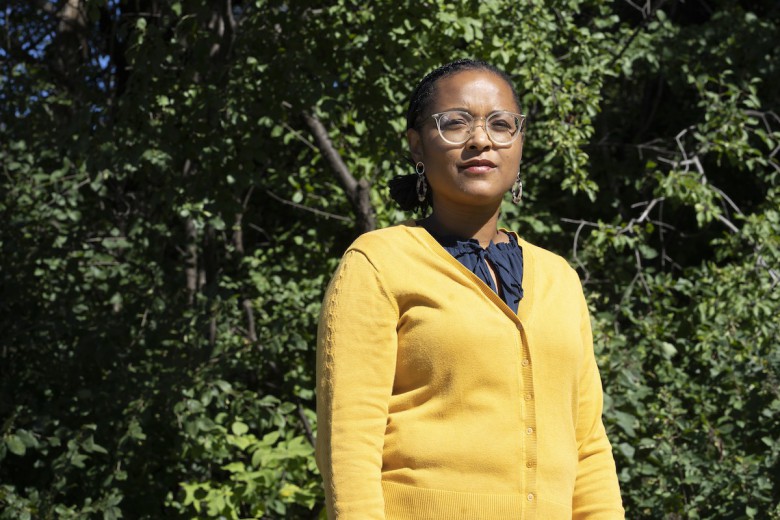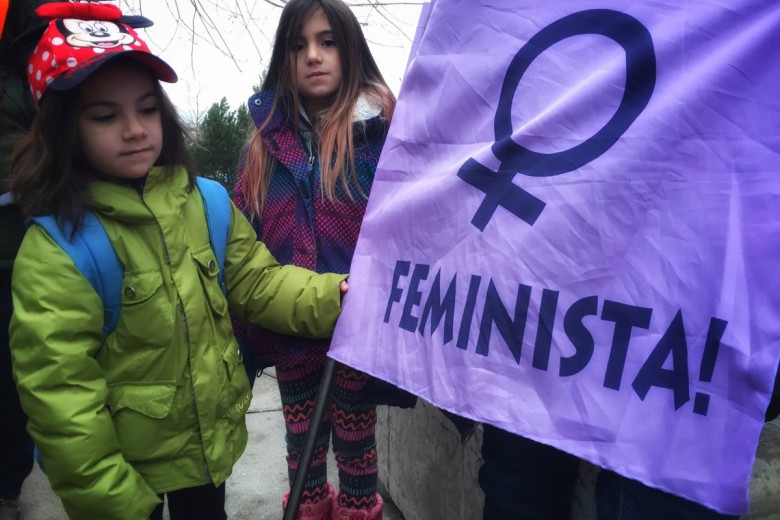Aina Kagis and Barb Byers recently retired from their posts in the labour movement – Kagis as Canadian Union of Public Employees Saskatchewan regional director, and Byers as secretary-treasurer of the Canadian Labour Congress. Over several weeks, the long-time friends exchanged letters reflecting on their tenure in the movement and the changes to the movement they envision.
Aina,
Looking back, now that I am “graduating” from official positions in the labour movement – but not retiring from the labour and social movements! – I’m considering goals I had that were never accomplished.
I’d hoped we would be further along in changing the labour movement from a male model of operation. There is still something at the base that says if you are a male you will do better at progressing through the labour movement, you will be listened to, your opinions seen as more valid and important. We have come an incredible distance since 1979. We still have an incredible distance to go.
We still expect excessive hours from activists in order to be seen as truly committed. I wish I had been a better role model. At the time, I was not seeing it from a gendered lens. I had worked long hours since I was 14. But the excessive hours in the labour movement would not have been possible if I’d had children to care for or other dependents. Thank the gawdesses I had people like you and other women who would bring to my attention when I was falling into the “doing it as good as the boys” trap.
We have come an incredible distance since 1979. We still have an incredible distance to go.
Also, while we have come a long way on the representation of women, young workers, and equity-seeking groups in all of our levels of governance, we still have a long way to go.
When I first became involved, our SGEU [Saskatchewan Government and General Employees’ Union] bargaining group won a reduced workweek for our members. I truly believed we were on the way to a 32-hour workweek for everyone! But we have stalled.
Even with these large issues that still need work, I feel proud of how the labour movement has changed over the years. We did important things in Saskatchewan to create that change – some large, some small. But they were all movement building.
In 1996 we were the first labour organization anywhere to host an Aboriginal labour conference, in collaboration with the Federation of Saskatchewan Indian Nations (as the Federation of Sovereign Indigenous Nations was then called) and the Métis Nation – Saskatchewan. We started the summer camp for teens in 1989, and the first Prairie School for Union Women in 1997, to develop skills and leadership for women, by women, with a feminist lens. The SFL [Saskatchewan Federation of Labour] was the first to bring in additional credentials for young workers to have a voice at union conventions. And we were part of the labour groups that provided workplace literacy programs.
At the CLC [Canadian Labour Congress], we took on an incredible research project on the effects of domestic violence in the workplace, and committed to develop tools and presentations for our activists to deliver in their unions, in their workplaces, and in collaboration with our community allies.
In the last federal election, a determined group of CLC activists worked with our allies to put child care on the federal election agenda. And we did! It will be there for the next elections until we achieve universal, affordable, accessible, culturally appropriate care for all children and their families.
I am content to hand over the future of labour education to the next group of social and equality activists. I was so lucky to learn from, and with, incredible people who are facilitators and course designers. Their voices echo in my heart, head, and soul every time I am working with a course or doing a presentation.
In solidarity and sisterhood,
Barb
—
Barb,
I so admire your ability to emphasize all that is positive in our movement; I certainly recognize our evolution but am a bit stuck in tooth-grinding frustration about the kinds of things that keep the movement stuck as well.
I’m thinking of a union’s national women’s task force with a mandate to identify barriers to women’s full participation and recommend structural changes to remove them – a task force that ends up being co-chaired by a middle-aged white male union leader. People cooked up all sorts of purportedly political justifications, of course, but the unspoken message? Such an enterprise can’t function without a man’s guidance. Or that the recommendations will be more politically palatable because a man was involved.
I’m thinking of the profound lack of a mentoring approach to leadership among the leaders in many of our unions. The inevitable outcome? “Well, there’s no secondary leadership, so I have to keep seeking elected positions.” I have never really understood what gives rise to the reluctance to share and encourage leadership. A desire to hang on to whatever power an elected leadership position in a union offers? A fear that encouraging diverse others to step into leadership roles means that the quality and nature of leadership, and thus of the union, will inevitably change? Because real mentorship requires really hard work?
All those people for whom the union doesn’t create meaningful space will take their energy, ideas, and fearlessness elsewhere.
The net result? The labour movement loses momentum – some would say becomes completely paralyzed. All those people for whom the union doesn’t create meaningful space (committees with autonomy to implement their mandate, or a seat – not a metaphorical one – at the executive board table, for example) will take their energy, ideas, and fearlessness elsewhere.
In friendship and struggle,
Aina
—
Barb,
I’ve been pondering how our movement’s lost momentum manifests itself.
I wonder if our leadership, being so committed to maintaining the status quo within the movement, doesn’t want to disrupt the social status quo too much, is too eager to be respected and considered as partners by governments, corporations (one and the same these days), and employers. It makes a limited kind of sense: government legislation controls our legal activities; employers have way more day-to-day effect on union members than does their union or the labour movement generally. Maybe garnering their respect seems valuable in the very short term.
But what about when partnership with power means abandoning the powerless? Are we supposed to applaud when a much-venerated and faux-militant leader (he says “fuck” a lot) has embraced (physically and philosophically) federal Liberal leader [and former prime minister] Paul Martin? Paul Martin – whose government slashed funding to every element of civil society, and who transferred jurisdiction of his shipping lines to avoid censure – legal and ethical – for the abysmal working conditions on his ships, and the exploitation of foreign workers.
And what about when our most senior labour leaders criticize young activists for physically turning their backs on our current prime minister? Disrespectful, they chide. But what respect is due from young people for a government and a prime minister who have done nothing to address youth unemployment, debt load, rising tuition?
We are timid, in contrast, to activists who disrupt the gatherings of their oppressors, even knowing they’ll be unceremoniously tossed out, probably arrested. Again, I can understand those who want resistance to be polite; if disruption and challenge create risk of nasty social censure, it’s easy to conclude that the better path must be caution, relying on effecting change through polite dialogue.
We are timid, in contrast, to activists who disrupt the gatherings of their oppressors, even knowing they’ll be unceremoniously tossed out, probably arrested.
But how is that working for us so far? In Saskatchewan, the ever-avuncular Don Morgan convinced much of the labour movement that he was the kinder, gentler face of the Sask. Party. He was given a platform at successive union conventions; leaders regularly met with him. And so he dodged responsibility for 1) illegal essential-services legislation; 2) anti-worker, anti-union amendments to labour legislation; 3) destructive cuts to K–12 education budgets; 4) demanding that public sector unions accept wage rollbacks.
So, the labour movement, notwithstanding that it has been at the forefront of most significant social change in Canada through many decades, ends up relegated to the sidelines of many movements and social justice initiatives.
In friendship and struggle,
Aina
—
Aina,
I don’t want to sugar-coat my time in the labour movement. I agree with everything you’ve said, but I also want to think that we took on these challenges inside the labour movement and some things are now different – and that unions are about more than a few leaders impressed with their own power.
When I went to the CLC, I had a photo in my office from my first CLC convention in 2002. A mop of curly red hair in a shag cut, big glasses, jeans, and a Saskatchewan Government Employees Association T-shirt that said, “A woman’s place is in her union.” I remember my excitement about being there, and my disappointment with the “democracy” on the floor: mics were controlled, the staff would radio to the front which commies were on which mics. I didn’t care. I was there to raise hell for workers! And I had that photo on display as a regular reminder not to sell my soul, to be the kind of leader I think and hope you and I tried to be.
I was sad to hear senior leaders criticize young workers who took on the prime minister at the CLC Young Workers’ Conference. I had some concerns about their floor strategy, but not on whether they had the right to voice their concerns. As Frederick Douglass said, “Power concedes nothing without a demand. It never did and it never will.” When I was a new activist, we had left groups that helped us develop floor strategies and analyze them before and after the events.
I don’t want to diminish the mentorship work that is done, often with a great struggle and few resources. But sometimes I feel like we are teaching the “mechanics” of the labour movement and those activists end up knowing more about how we “administer” ourselves than the politics of our movement in the broadest sense. Where are those debates that stretch our political understandings?
I put myself in the shoes of an activist or someone in the community who feels they have little power to challenge the leaders of labour to do more and do better; it is a risk, but what is an alternative? Just be cautious and be sidelined?
Sometimes I feel like we are teaching the “mechanics” of the labour movement and those activists end up knowing more about how we “administer” ourselves than the politics of our movement in the broadest sense.
I became involved in my union because I saw it as a place where I could advance social justice issues outside of collective bargaining concerns. I was looking for a place that could take on anti-poverty, anti-racism, social welfare issues in a systematic way, as sometimes I was tired of being caught in a “revolving door” of injustices. The union became the place for me to create some change in the workplace and in the community. That isn’t always easy because members expect that their grievances should come first. And we haven’t always done our work about why trade deals, unemployment insurance, anti-racism, public policy issues, anti-apartheid work, and numerous other issues are important to them as union members.
Pushing those issues was and is always a risk. But they are as important and as long-lasting and as supportive of movement building as advances in our collective agreements.
As I look back since the first time I walked into the SGEU building in 1979, it is those struggles in the community, in the union, and at the bargaining table that sustained me.
In solidarity and sisterhood,
Barb
—
Barb,
Your Frederick Douglass quote really acts as a touchstone here. Of course, the power to which he was referring was and remains murderous, but his words apply equally to any challenge to entrenched power structures and practices in the labour movement (or anywhere else, for that matter).
I think anyone who wants to push their union in a different, better direction has to be fearless. In the context of union gatherings, activists who are demanding change can certainly expect to be thwarted by rules of order trumpeted from the head table or podium, or to have their comments greeted with icy silence. Either experience can be unnerving, so I think another requirement for change makers is not to challenge alone. That hearkens back, Barb, to your reminiscences about the gatherings of like-minded lefties to strategize, analyze and above all, give each other support.
And developing such groups in turn requires seeking out fellow travellers within the union but outside the formal structures of meetings, conventions, and the like.
Many unions have moved away from pure “business unionism” – that is, from focusing solely on workplace issues, grievances, and collective bargaining – to some manner of social unionism, engaging with issues and other movements that are more about the common good
I think it’s fair to say that many unions have moved away from pure “business unionism” – that is, from focusing solely on workplace issues, grievances, and collective bargaining – to some manner of social unionism, engaging with issues and other movements that are more about the common good, whether locally or more broadly. I think understanding how to be a good ally has to inform that engagement.
Sometimes, though, social unionism creates a new set of issues. Unions generally have more resources than do the groups with which they ally themselves, so they are frequently inclined to take up a lot of space.
Allies need to listen, learn, and above all, recognize that being an ally does not make them special, entitle them to any particular kudos from the group. Real allies don’t suck up the emotional energy in a gathering: if an ally has a come-to-Jesus moment about their racist past, for instance, they must not inflict the moment on a group of people who experience racism every day.
I’m really happy that in the last number of years, a lot of dedicated change makers have taken their energy into the labour movement. I’m pretty sure that in five or 10 years, the particular set of barriers we’ve talked about will be demolished by that energy.
A luta continua,
Aina







